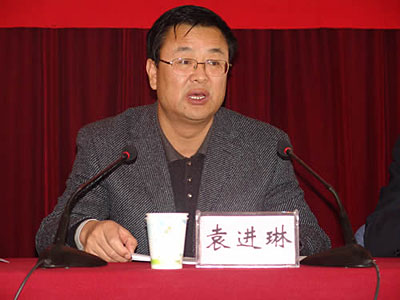|

"The canals that were built in the Qin Dynasty (dating back more than 2,000 years) are still in use nowadays," said Yuan Jinlin, Party Secretary of the Development and Reform Commission of Ningxia Hui Autonomous Region.
There is no pride on Yuan's face, rather a deep concern about the shortage of water resources.
Chinese Premier Wen Jiabao delivered a government work report at the first session of the 11th National People's Congress on the morning of March 5, calling for the promoting of coordinated development among different regions, further promoting the development of western China, and giving priorities to the development of key areas.

No wonder the development of the western region has become a hot topic among the deputies of Ningxia. Established in 1958, Ningxia covers an area of 66,400 sq km, of which mountains and highlands account for 75 percent. It is inhabited by some five million people; 33 percent of the population are ethnic Hui, descendants of a Middle Eastern community that emigrated at the beginning of the 13th century. Situated on the upper and middle reaches of the Yellow River -- China's second longest river -- the region is 1, 200 km from the sea and has a typical continental climate, with summer temperatures rising to as high as 39 degrees centigrade and winter temperatures plummeting to 30 degrees below. Due to its geological features, wherein the southern part is higher than the northern, there is a striking difference -- the southern part is colder, more humid and sees more rainfall than the northern section. The Yellow River flows 397 km through its land, and is the main source of irrigation.
Embarrassingly, however, a shortage of water hampers Ningxia's economic development. According to Yuan, on the one hand, there are some 500,000 residents in the driest northern Ningxia who are long-term sufferers of this paucity; on the other hand, water wastage remains prevalent due to the absence of an advanced irrigation system. Statistics show that only 0.4 of 1 cubic meter of water is properly used.
The local government has proposed the construction of water-saving agricultural methods, and the idea that the right to use water should be converted. According to Yuan, the right to use water in the agriculture sector will be given over to the industrial sector, which enjoys better revenues; in return, part of the revenues will be used in constructing an advanced irrigation system for agriculture. The move seems simple on the surface; however, it has already given new momentum to the development of local industry.
"It is a good way to address the water use in industry, but the work is only half done. State-owned commercial banks need to change their minds as well, to further promote the local economy," said Yuan.
The hunger for financial resources has increased in some rural areas in Ningxia, as the local economy develops in tandem with the Western China Development program. However, the withdrawal of state-owned commercial banks from rural areas is also on the rise, due to low revenue.
"This is nothing new to residents in some areas where banks are closing down," said Yuan. "They cannot deposit money, or get loans. As a result, some investors had to take large amounts of cash directly to the construction sites, escorted by bodyguards."
The main reason for this large-scale withdrawal is "high-end strategy", with banks shifting their targets to big cities, profitable industries, big corporations, projects and clients.
"Earning more money is no problem at all, but please do not ignore small clients and opportunities," said Yuan. "Ningxia will definitely do a better job with its rich mining and tourism resources as well as cheap labor force, if a small amount of loans is granted. Perceptive bankers will not miss this opportunity." | 